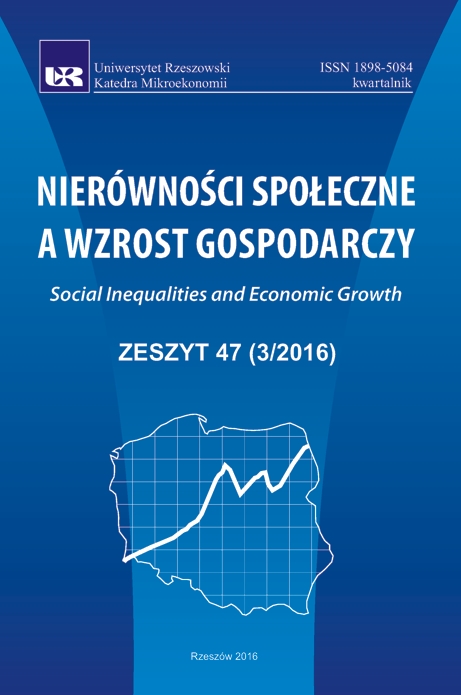Globalizacja a nierówności w rozwoju wybranych krajów
Globalization and Inequality in the Development of Selected Countries
Author(s): Natalia Iwaszczuk, Jadwiga Orłowska-Puzio, Bartosz ŁamaszSubject(s): Economy, Supranational / Global Economy, Socio-Economic Research
Published by: Wydawnictwo Uniwersytetu Rzeszowskiego
Keywords: globalization; economic and social inequality; GDP per capita; Gini index
Summary/Abstract: Globalization and its consequences are the focus of a debate held by many “great minds” in the modern world. This process involves both positive and negative phenomena. The positives include fast economic growth – especially in developing countries. Among these countries, the leaders are Brazil, Russia, India, China, and in recent years also South Africa. In turn, the “dark side” of globalization undoubtedly includes growing social and economic inequalities throughout the world. The increase in income inequality of society can be measured by the Gini index. The closer its value is to 0, the lower the level of income distribution inequality in a given country. Growing differences between the earnings of the richest and the poorest result in an increase in dissatisfaction of this second group. It is true that in recent years there has been success in reducing the proportion of people who are forced to live below the poverty line, but such people are still very many, and their number is still close to 1 billion. It is also important that the richest are just a small group of people that are in possession of a large part of world’s wealth. So growing inequalities lead to the fact that dissatisfied citizens of the poorest countries decide to leave their home countries and seek a better quality of life in western countries. If in the coming years the economic situation in the poorest countries will not improve significantly, the process of migration of poor populations can threaten the balance and security of the whole world.
Journal: Nierówności Społeczne a Wzrost Gospodarczy
- Issue Year: 2016
- Issue No: 47
- Page Range: 161-174
- Page Count: 14
- Language: Polish

